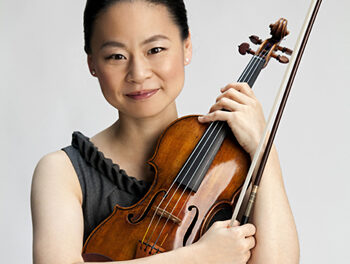The Durham Medical Orchestra (DMO), affiliated with the Office of the Vice Provost for the Arts of Duke University, was founded in 2010 by volunteer musicians with the mission to unite health-related professionals, Duke University, and the surrounding community through musical performance and collaboration to foster health, wellness, and the cultural enrichment of its audiences and members.
Under the baton of the genial and gifted Austrian conductor, Verena Mösenbichler-Bryant, the DMO presented its spring concert tagged, “Joyride” in Baldwin Auditorium. The concert began with a 2005 work by Brooklyn-based composer Michael Markowski. In this composition, he has combined elements of Beethoven’s “Ode to Joy” theme from the 9th Symphony with material from John Adam’s “Short Ride in a Fast Machine” and called it, “Joyride.” It was a lively and triumphant piece.
This was followed by the familiar lush and lilting waltz, “Over the Waves” by the Mexican composer, Juventino Rosas. His best known composition, it has remained popular since its premier in 1888 and remains a favorite with country and old-time fiddlers in the United States. Also, it was used for the song “The Loveliest Night of the Year,” which was sung by Ann Blyth in MGM’s film The Great Caruso.
Next on the program was the hauntingly beautiful “In the Steppes of Central Asia” by Alexander Borodin. It depicts a caravan of Central Asians crossing the desert under the protection of Russian troops. The opening theme, representing the Russians, is played by the solo clarinet; then we hear the strains of an ornamented eastern melody on English horn, representing the Asians. These two melodies combine in rich counterpoint and are accompanied by a “traveling” pizzicato theme that represents the plodding hoofs of the horses and camels. As the caravan moves away in the distance the music fades and at the end only the Russian theme is heard hauntingly played by the solo flute. It was very nicely done, especially by the solo woodwinds.
To wrap up the first half of the “Joyride” concert Mösenbichler-Bryant chose a Cinco de Mayo favorite by the Mexican composer, Arturo Marquez – “Conga del Fuego Nuevo.” The orchestra seemed to take great pleasure in playing this lively celebration of the new fire, as did the audience.
The second half of the concert was given over to the challenging performance of Tchaikovsky’s Symphony No. 4 in F minor, Op. 36. Written during a particularly difficult period in his personal life and during the development of his relationship with his patroness Nadezhda von Meck, to whom he dedicated the symphony and with whom he carried on a supportive relationship through correspondence alone until his death in 1893. It was she who suggested Tchaikovsky write a program explaining the symphony which led many critics and musicologists to dismiss the purely musical qualities of the work.
The first movement follows a development of Tchaikovsky’s unique approach, breaking considerably from standard symphonic form. It is longer and more intricately developed than the following three movements. It opens with a fanfare which contains the core theme of the movement and returns as a marker throughout. The Moderato con anima section is a sad but beautiful waltz written in 9/8 time, which was most appealing in this performance. The movement ends with a series of powerfully driven, rapidly repeated chords.
The second movement Andantino is introduced by a melancholy melody played by the oboe. The impassioned climax is a reminder of grieving we heard in the opening movement. The orchestra seemed very much at home here.
The third movement Scherzo is a pizzicato tour de force. Even when the brass join in, it is quiet and staccato, and the woodwinds virtually sparkle. The movement ends quietly with the pizzicato strings. For those who are familiar with this work, the ending of the third movement seems to bring you forward on your seat in anticipation of the rousing and racing entrance (Allegro fuoco) of the fourth movement. Tchaikovsky employs a well-known Russian folksong here. The coda adds a vigorous and triumphant finale.
All in all, the Durham Medical Orchestra gave a credible and enjoyable concert which the audience accepted with enthusiasm. We were treated to an exceptional encore: a suite of songs from the movie Beauty and the Beast, with lyrics by Howard Ashman and music by Alan Menken, arranged by Calvin Custer. The outstanding soprano voice of Minji Kim was accompanied by the DMO in their best Hollywood sonority. It was a pleasure to hear.












